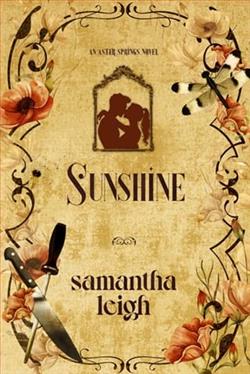Page 52 of The Secret Keeper of Jaipur
Malik lifts my suitcase into the trunk of the stately sedan, which Kanta’s father upgrades every five years on their wedding anniversary. This must be their third Ambassador. Her family has money, whereas Manu comes from humble beginnings. The palace provides Manu a driver and a Jeep for work, so Kanta and her mother-in-law can always have this sedan at their disposal.
After Malik helps me into the passenger’s seat, I say, “Now, before you tell me what’s going on, let me assure you that Nimmi misses you terribly, Rekha asks after you constantly, Chullu has started to speak and Jay is fine. Oh, he asks about you all the time, too.”
He chuckles. That’s better. I’m not going to tell him about Nimmi’s outburst last night. I left the house early enough this morning that I didn’t see her. (Was I trying to avoid her?) Either way, I had time on the train to think about what she said and whether there was any truth in it. Do I feel possessive about Malik? Yes, I do. I feel about him the same way I feel about my sister, Radha. I want both of them to do well, to develop their skills and use those skills in whatever way they wish. How could that be wrong? Why should I feel guilty for helping them along their path?
With Radha, I think I fell short. She met Pierre Fontaine at the Shimla Mall in her last year at Auckland House School. Pierre was twenty-eight—ten years older than Radha—and absolutely smitten with her. He knew nothing about her past, the baby she gave up for adoption at thirteen. He came to ask me for my blessing, which warmed me to him. He was thoughtful, kind. And French, of course.
Radha had studied French at Auckland and fallen in love, first with the language and then with Pierre. I would rather she had enrolled at college in nearby Chandigarh instead of marrying, but by then I knew how headstrong she can be; the more I fight her on an issue, the deeper she digs in. (I’ve often thought she’s like the Himalayan balsam, a deceptively delicate flowering plant that’s hard to tame.)
In the end, I gave Radha and Pierre my blessing. It seems to have worked out well. Radha trained at a fragrance house and became a perfumer. She was always good at mixing my henna paste, and testing the mixture with different oils, lemon juice and sugar to create the right silky consistency. And the scent of it was heavenly.
Radha has what she always wanted: a family. She sends me photos of her two adorable daughters—Asha, now two, and Shanti, four years old.
Malik slides in behind the steering wheel. “Nikhil has a cricket game tonight, so Kanta Auntie asked me to drive you there first.Accha, Boss?”
I tap his arm to reassure myself he’s really here.“Accha.”
Malik eases the Ambassador through the clog of cycle rickshaws, taxis and pedestrians. “Can’t tell you how glad I am to see you. I called this morning but got no answer.”
“Jay had probably left for work.” I’m looking out the window, enjoying the choreographed chaos of the city: a lipstickedhijraon her way to the market, slim hips swaying; a wagon drawn by a bony laborer carrying old tractor tires; children flicking marbles on a dusty street corner—what Malik liked to do once upon a time in Jaipur.
Malik slows for a family of six balanced precariously on a motor scooter. “I want to thank you for taking Nimmi under your wing.”
“Koi baat nahee.She’s a hard worker. And I’m enjoy teaching Rekha how to read.”
“I bet she learns fast, my little monkey.” There is so much affection in his tone that it makes me smile. “Permission to talk frankly, Auntie-Boss?”
I turn to him and nod.
“I’m trying to piece together what happened at the cinema house the other night, and why. But every time I find something that doesn’t look right to me, I get shut down. Samir, Hakeem and even Manu don’t want me to pry any further.”
“Well, it’s not your job, is it, Malik? To investigate? Shouldn’t you be concentrating on what Manu’s teaching you?” For half a second, I wonder if Malik did something that got Manu in trouble. Not deliberately, but by accident.
“That’s exactly what Iamdoing.” Malik taps his horn at a woman carrying a basket of beans on her head. She moves to the side of the road. “After the collapse, I found these...chunks of bricks in the debris. Lots of them.”
My ears perk up. He goes on to describe bricks similar to the ones I saw at Canara Enterprises.
“The project specifies cement mortar—not bricks—for the columns. I’ve examined the contracts. I’mnotwrong. But no one wants to listen to me.”
I’mlistening. And what Malik’s saying makes my heart race. He describes the ledgers where he enters figures; how the purchase receipts for bricks and cement were altered by Ravi right in front of Malik’s eyes and then replaced in the files; how the numbers in the ledgers have been altered, too.
By the time he finishes, my palms are sweating and ideas are buzzing in my head like bees. I’m trying to connect the threads, but they come and go before I can make sense of them. I moisten my lips, realizing, only then, I’m parched, as if I haven’t had a drink of water in days.
The car comes to a stop, and Malik turns off the ignition. When I look around, I see we’re at the cricket grounds. A group of boys in cricket whites are milling about the field. It’s dusk and the park lights have come on. A man with a whistle stands on the sidelines, refereeing the game. Malik reaches behind the front seat and grabs a thermos. He unscrews the top and fills it with steaming chai; the scent of cardamom, cinnamon and cloves fills the car. He hands me the cup, and I sip from it. The chai’s delicious and sweetened just the way I like.
“May you live a thousand years,”I say,“and may every year have fifty thousand days.”I bless his thoughtfulness by placing my hand on his head.
He grins. “Okay if we just watch from the car? I think it’s not a good idea to have you standing in public next to Niki with fifty of the Agarwals’ closest friends.” Of course, he’s right. Indians with eyes the color of the ocean are unusual, and Niki’s eyes are like mine, and like my sister’s. The gossip-eaters would take notice.
We watch the game for a few minutes while I finish my tea. I’m thinking about what Malik has told me. I don’t want him worrying about Nimmi, but I need to tell him some of what’s been going on in Shimla.
“Baat suno,”I say.
I tell him that two children found a sheep wandering the hills; how Nimmi recognized it as belonging to her brother’s flock; that we found the flock—and her brother—and discovered that the sheep were carrying gold; how we brought Vinay’s body on horseback to be cremated in town; and how we then delivered the gold to the next courier.
At each new piece of information, Malik’s eyes widen and his breathing quickens.
“But... Nimmi’s all right, isn’t she? And Rekha and Chullu?”















